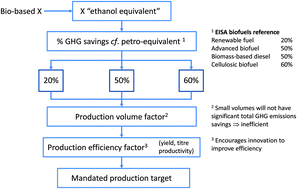Balancing the bioeconomy: supporting biofuels and bio-based materials in public policy
Abstract
Key objectives for a bioeconomy are now embedded in the strategic activities of more than 30 countries, with an increasing number developing a national bioeconomy strategy. In a bioeconomy, fossil-based commodities and electricity start to be replaced by bio-based. This is meant to address some of the so-called ‘grand challenges’ being faced by society, but especially energy security (by reducing dependence on imported fossil fuels) and climate change (by reducing greenhouse gas emissions). However, in the vast majority of countries that have bioenergy and biofuels policies, there is either no policy support for bio-based materials (especially chemicals and plastics) or it is limited to R&D subsidy. And yet, studies repeatedly show that higher added value and job creation are to be found in materials production. This paper suggests a cost-effective public policy strategy to redress this balance. The strategy also addresses a weakness of bio-based production – low efficiency – by creating stimulus for companies to innovate their biocatalysts and bioprocesses.


 Please wait while we load your content...
Please wait while we load your content...